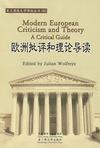欧洲批评和理论导读
出版时间:2009-1 出版社:中国海洋大学 作者:沃弗雷 页数:434
Tag标签:无
前言
经过一段时间的酝酿,这套“英文原版文学理论丛书”终于陆续和读者见面了。我们出版这套丛书的初衷主要有以下两个方面:(1)我国的外国文学研究有两条战线、两支队伍,一支在文学院,一支在外语学院。改革开放以来,由于国内外交流的推进和学科研究的发展,两支队伍逐渐靠拢,比较文学的队伍在渐渐扩大。高等院校外国文学专业不但有很多本科生,而且建设了许多硕士点和博士点。文学理论(通常叫西方文论)是该专业的主干课程之一,但国内过去引进的这类外文原版书很少,有的(包括某些教材)文字太难,师生反映这方面的参考书太少,尤其是适合中文系该专业师生阅读的此类书更少。我们引进这套丛书,就是为了满足广大师生教学科研的迫切需要。(2)随着全球化的到来,国内外的学术交流越来越快地向深广发展。要进一步促进这种交流的发展,需要做好三个方面的工作,一要较快地提高广大师生的外语能力,达到用外语进行学术交流的水平;二要深入了解国外该学术领域的最新研究成果和发展动态与趋势;三要有目的有计划地将我们国内的研究成果介绍给国外的同行。我们引进的这套丛书可以在这三个方面发挥很有效的作用,尤其是在提高用外语撰写专业论文与学术著作的水平方面,最有效的方法就是研读该专业国外原版著作,因为这样既能较深入地了解外国同行的研究成果,同时又能潜移默化地提高使用外语的水平。在确定书目时,我们的原则是先介绍基础理论方面的著作和最新研究成果,再介绍专题研究,着重从国外主要学术出版社中进行选择。丛书的读者对象是外语学院与文学院外国文学专业和比较文学专业的教师、研究生和相关研究者。必须指出的是,我们介绍国外的文学理论,并不表明我们完全赞同其观点。有了解才有继承与批判。我们希望读者诸君在全面了解国外同行研究成果的基础上,吸收其有益的成分,摒弃其片面甚至错误的成分,促进文学理论研究在我国的健康发展。
内容概要
《欧洲批评和理论导读》全面介绍了:欧洲“理论”中的各种思潮,对自启蒙运动至今文学和文化研究及诗学、心理学、语言学和心理分析中的各种主要流派进行了梳理。书中的50余篇文章都由相关领域的权威学者撰写,涉及subjectivity、identity和gender等概念,分析了我们思考、观察和行动的方式。每篇文章后面都列有建议阅读书目。《欧洲批评和理论导读》对读者深入理解欧洲文学理论极有帮助。
作者简介
作者:(美国)沃弗雷 (Wolfreys.J.)朱利安·沃弗雷,是佛罗里达大学的英语教授,著述丰富,最新著作有:Glossalalia,Thinking Difference,The J.Hillis Miller Reader a nd The Same Story With a Difference:Pickwick’S Vision。
书籍目录
Preface1.Rene Descartes and Baruch Spinoza:BeginningsWan'en Montag2.Immanuel Kant and Georg Wiihelm Friedrich HegelJacques Lepta3.Johann Christian Friedrich Ho1derlinVeronique M.Foti4.Karl MarxRobert C.Holub5.Charles Baudelaire and Stephane MallarmeElizabeth Constable6.Friedrich NietzscheRobert C.Holub7.Sigmund FreudJuliet Flower MacCanneU8.Ferdinand de Saussure and Structural LinguisticsKenneth Womack9.Edmund HusserlClaire Colebrook10.PhenomenologyUllrich Michaei Haase11.Gaston Bachelard and Oeorges Canguilhem:Epistemology in FranceAlison Ross and Amlr Ahmadi12.Jean Paulhan and/versus Francis PongeJan Baetens13.Gyorgy LukacsMitchell R.Lewis14.Russian Formalism,the Moscow Linguistics Circle,and Prague Stmcturalism:Boris Eichenbaum,Jan Mukarovslcy,Victor Shklovsky,Yuri Tynyanov,Roman JakobsonKenneth Womack15.Ludwig WittgensteinWilliam Flesch16.Martin HeideggerChire Colebrook17.Antonio OramsciStephen Shapiro18.Walter BenjaminJeremy TambUng19.Reception Theory:Roman Ingarden,Hans Georg Gadamer and the Geneva SchoolLuke Ferretter20.The Frankfurt School,the Marxist T均dition,Culture and Critical Thinking:Max Horkheimer,Herbert Marcuse,Theodor Adomo,Jargen HabermasKenneth Surrin21.Mikhail BakhtinR.Brandon Kershner22.Georges Bataille and Maurice BlanchotArkady Plomitsky23.Bertolt BrechtLoren Kruger24.1acques LacanJuliet Flower MacCanneU25.The Reception of Hegel and Heidegger in France:Alexandre Kojeve,Jean Hyppolite,Maurice Merleau PontyJean Michel Rabate26.Jean,Paul Sartre,Albert Camus and ExistentialismMark Currie27.Emmanuel LevinasKevin Hart28.Simone de Beauvoir and French FeminismKaren Green29.Claude Levi StraussBoris Wiseman30.Jean GenetAlain Michef Rocheleau31.Paul RicoeurMartin McQuilhn32.Roland BarthesNick Mansfield33.French Structumlism:A.J.Oreimas,Tzvetan Todorov and Gerard GenetmDirk de Geest34.Louis Althusser and his CircleWarren Montag35.Reception Theory and Reader Response:Hans Robert Jauss,Wolfgang Iser,and the School of KonstamJeremy Lane36.Jean,Francois Lyotard and Jearl Baudrillard:The Suspicion of MetanarmtivesGarry Leonard37.The Social and the Cultural:Michel de Certeau,Pierre Bourdieu and Louis MarinBrian Niro38.GiUes Deleme and Kltx GuattariClaire Colebrook39.Michel FoucaultJohn Brannigan40.Jacques DerridaKevin Hart41.Luce IrigarayEwa Ziarek42.Christian MetzMarcia Butzel43.Guy Debord and the Situationist InternationalLynn A.Higgins44.Umberto EcoSurfftee Kim Gmz45.Modernities:Paul Virilio,Oiarmi Vattimo,Giorgio AgambenDavid Punter46.helene CixousJuliet Flower MacCanneu47.Philippe Lacoue Labarthe and Jean Luc NancyHeesok Chang48.Iulia KristevaJoan Bran&49.Slavoj ZizekMiichael Wash50.Cahiers du CinernaMaureen Turim51.Critical Fictions:Experiments in Writing from Le Nouveau Roman to the Oulipojean Baetens52.Tel QuelJean Michel Rabate53.Other French Feminisms:Sarah Kofman,Monique Wittig,Michele Le DoeuffNicoh Fluhr54.Psychoanalytic Literary Criticism in FranceNicholas T.RandContributorsIndex
章节摘录
In his 1949 essay, 'The Mirror Stage' (1966), Jacques Lacan, attempting to take his distance from existentialism, divided philosophy into two camps: those that took the Cog/to as their starting point and those that did not (this statement was repeated many times after, including by some of France's most important thinkers, among them Foucault and Canguilhem). With such a statement, Lacan located the origins of French or even European philosophy not in Husserl, Hegel or even Kant, but in the conflictual field of seventeenth-century philosophy, specifically in the opposing doctrines of Rene Descartes and Baruch Spinoza. This may come as a surprise to the Anglo-American reader for whom the only conflict associated with the seventeenth-century is that between rationalism and empiricism and for whom Spinoza is a secondary or even tertiary figure, a minor Cartesian only recently admitted into the canon of philosophers deemed worthy of scholarly attention. Further, while Descartes's Meditations is well-known even outside the field of philosophy, his name is primarily associated with his proof of God's existence and, through Locke, the doctrine of innate ideas, neither of which are particularly relevant to the concerns of modem French philosophy and theory. How then are we to understand the sense in which the conflict between these two philosophers (assuming that their relation is one of conflict) constitutes a 'beginning'?There is no question of identifying a French or even continental reading, or readings, of Descartes and Spinoza which would then become the correct interpretation in counter-position to the Anglo-American. Nor is it a question of simply multiplying readings as if, without any true relation to their object, they can never be any other than projections of the culture or historical moment in which they emerge. Instead, we will argue that specific historical moments impose on philosophical texts a historically determined (and therefore identifiable) grid that in turn determines what in a text is visible or invisible, what is compelling and what devoid of interest. There are thus no readings independent of texts and no texts independent of reading. Both the text and its history are equally real, equally material; both must be explained.
编辑推荐
《欧洲批评和理论导读》由中国海洋大学出版社,爱丁堡大学出版社出版。
图书封面
图书标签Tags
无
评论、评分、阅读与下载
